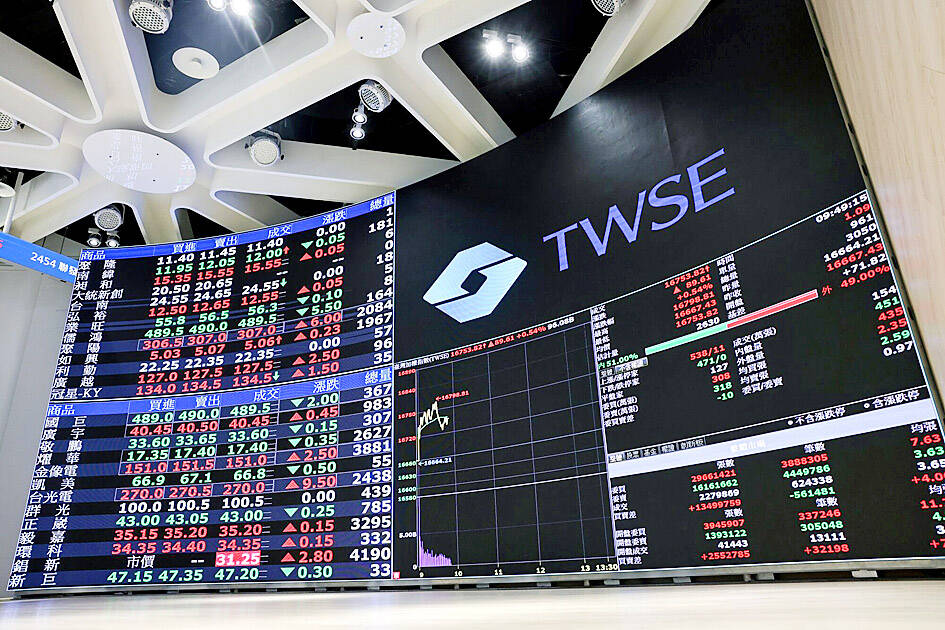Foreign institutional investors profited US$125.4 billion from their investments in the local stock market between January 2020 and August this year, despite ups and downs in Taiwanese shares during that period, the central bank said in a report last Tuesday.
The significant profit enjoyed by foreign institutional investors reflected their effective investment strategies, such as holding blue-chip stocks long-term and cutting their holdings of certain stocks at the right time, it said.
The US$125.4 billion profit included US$55.2 billion from cash dividends, the central bank said, adding that foreign institutional investors had sent most of their profits out of Taiwan.

Photo: Bloomberg
With Taiwan's profitable electronics sector, led by contract chipmaker Taiwan Semiconductor Manufacturing Co (TSMC, 台積電), foreign institutional investors tended to park their funds in large-cap tech stocks with sound fundamentals and subsequently enjoyed an uptrend in share prices following a tech frenzy in global markets, it said.
In addition, foreign institutional investors were successful in finding the right time to sell TSMC shares and other tech heavyweights, while local investors tended to chase those stocks, the central bank said.
Between January 2020 and August this year, foreign institutional investors registered a return of about 57 percent in their stock investments in Taiwan, it said.
In the first eight months of this year, the TAIEX staged a strong comeback from a slump seen last year due to expectations that the US interest rate hike cycle would shortly come to an end.
Last year, the TAIEX plunged 22.4 percent after foreign institutional investors sold more than NT$1.2 trillion amid escalating geopolitical tensions following Russia's invasion of Ukraine and as the Fed pushed up its key interest rates aggressively.
In 2021, the TAIEX soared 23.7 percent despite a net sale of about NT$454 billion by foreign institutional investors, while the TAIEX surged 22.8 percent in 2020 even though foreign institutional investors dumped NT$540.15 billion worth of shares.
As of the end of August, foreign institutional investors had invested about US$562.5 billion in the local stock market, and in addition to their pocketed gains, they still had US$332.7 billion in unrealized profit, the central bank said.

TECH BOOST: New TSMC wafer fabs in Arizona are to dramatically improve US advanced chip production, a report by market research firm TrendForce said With Taiwan Semiconductor Manufacturing Co (TSMC, 台積電) pouring large funds into Arizona, the US is expected to see an improvement in its status to become the second-largest maker of advanced semiconductors in 2027, Taipei-based market researcher TrendForce Corp (集邦科技) said in a report last week. TrendForce estimates the US would account for a 21 percent share in the global advanced integrated circuit (IC) production market by 2027, sharply up from the current 9 percent, as TSMC is investing US$65 billion to build three wafer fabs in Arizona, the report said. TrendForce defined the advanced chipmaking processes as the 7-nanometer process or more

China’s Huawei Technologies Co (華為) plans to start mass-producing its most advanced artificial intelligence (AI) chip in the first quarter of next year, even as it struggles to make enough chips due to US restrictions, two people familiar with the matter said. The telecoms conglomerate has sent samples of the Ascend 910C — its newest chip, meant to rival those made by US chipmaker Nvidia Corp — to some technology firms and started taking orders, the sources told Reuters. The 910C is being made by top Chinese contract chipmaker Semiconductor Manufacturing International Corp (SMIC, 中芯) on its N+2 process, but a lack

Who would not want a social media audience that grows without new content? During the three years she paused production of her short do-it-yourself (DIY) farmer’s lifestyle videos, Chinese vlogger Li Ziqi (李子柒), 34, has seen her YouTube subscribers increase to 20.2 million from about 14 million. While YouTube is banned in China, her fan base there — although not the size of YouTube’s MrBeast, who has 330 million subscribers — is close to 100 million across the country’s social media platforms Douyin (抖音), Sina Weibo (新浪微博) and Xiaohongshu (小紅書). When Li finally released new videos last week — ending what has

OPEN SCIENCE: International collaboration on math and science will persevere even if the incoming Trump administration imposes strict controls, Nvidia’s CEO said Nvidia Corp CEO Jensen Huang (黃仁勳) said on Saturday that global cooperation in technology would continue even if the incoming US administration imposes stricter export controls on advanced computing products. US president-elect Donald Trump, in his first term in office, imposed restrictions on the sale of US technology to China citing national security — a policy continued under US President Joe Biden. The curbs forced Nvidia, the world’s leading maker of chips used for artificial intelligence (AI) applications, to change its product lineup in China. The US chipmaking giant last week reported record-high quarterly revenue on the back of strong AI chip